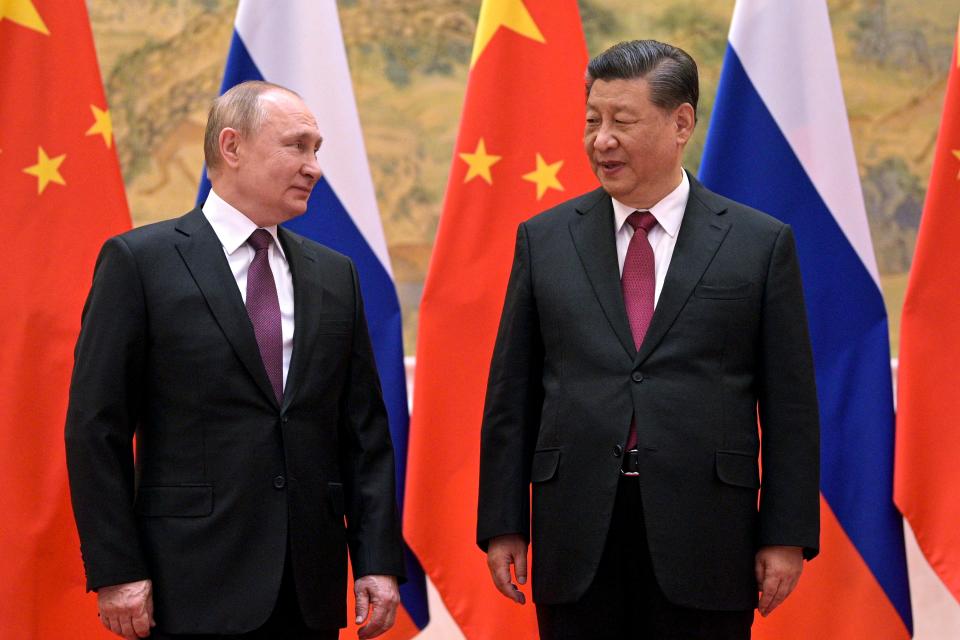How worried should we be about Russia and China working together?
- Oops!Something went wrong.Please try again later.
The recent summit between the leaders of Russia and China, Vladimir Putin and Xi Jinping, was generally viewed with alarm by foreign policy observers in the United States.
And there is reason for concern over two autocrats with powerful militaries joining closer together in what is clearly an anti-American alliance.
But there were also grounds for optimism in the joint statement issued in conjunction with the summit. It began with what can fairly be described as a lengthy and defensive rationalization for the legitimacy of their regimes.
In the U.S. view, as expressed in the Declaration of Independence, the legitimacy of a government rests upon consent of the governed. And, in the American credo, that can only be obtained through periodic elections in which the governed have a realistic opportunity to change who is doing the governing.
It's not a confident statement from Russia or China

The people of Russia and China have no such realistic opportunity. But, rather than claim the superiority of fixed autocratic rule by what Putin and Xi undoubtedly regard as an enlightened elite, the joint statement acknowledges the universality of the value of democratic governance.
Instead, the claim is that the autocrats of the world embody and discern Rousseau’s general will through means other than periodic elections in which those doing the governing can be given the boot.
Robb: Biden is right on Russia and China but wrong on what to do next
This was not a statement issued by two leaders confident that the future belongs to them. Instead, it was two autocrats worried about becoming isolated or falling victim to a color revolution, and seeking to make the world a bit safer for authoritarian governance.
The values of American democratic capitalism still resonate. It is remarkable how many autocrats around the world, including Putin, feel the need to run periodic rigged elections, to create the pretense of democratic choice to underpin their claims to legitimacy.
Autocratic governance is spreading, not shrinking as it did for a couple of decades. But the appeal of liberty and democratic governance has not shrunk. The autocrats of the world still feel obligated to pay homage to them, and seek to redefine them.
Both have demographic and economic challenges
In addition to asserting that there are different conditions that could be called democracy, the joint statement was pained to say that there are different paths to economic development. Again, an attempt to assert legitimacy for China’s system of state capitalism and Russia’s crony capitalism.
Here again, the joint statement was mostly defensive, rather than a confident expression that the future belongs to the Chinese and Russian way.
And with good reason. Russia has a GDP per capita less than half that of the United States. China, despite being perceived as an economic juggernaut, has a GDP per capita less than a third that of ours.
In foreign policy circles, there is a sense of urgency about the need to do something about the Russian-Chinese alliance. Instead, some strategic patience might be in order.
The future does not belong to Russia and China. Both have the legitimacy and succession issues inherent in authoritarian regimes. Both face daunting demographic and economic challenges.
In many respects, the United States and other democratic capitalist countries can wait them out. There would be, and are, issues and conflicts to manage along the way. But no need for panicked or frenzied responses.
Time is on the U.S. side, not theirs
There were some other insights to be gleaned from the joint statement, which was perhaps unintentionally revealing in some respects.
Russia and China clearly intend to bog down the United States and bind it through multilateral organizations, particularly the United Nations.
Rush Doshi’s “The Long Game,” written before he became the Biden administration’s national security adviser on China, documents how China pursued what he calls a blunting strategy to dilute U.S. influence. A significant part of this involved participating vigorously in multilateral organizations and gaining sufficient clout to prevent them from being used by the United States to exert pressure on China.
With both Russia and China holding veto power in the U.N. Security Council, it is the ultimate blunting opportunity. The more international diplomacy flows through the U.N., the better for Russia and China. The U.S. should take note.
On the other hand, coordination among independent but like-minded nation-states worries the autocratic alliance, particularly China. The recent agreement among the United States, Britain and Australia to coordinate and cooperate on security matters, beginning with helping Australia develop a nuclear-powered submarine fleet, came in for special criticism in the joint statement. Again, the U.S. should take note.
Strategic patience with respect to Russia and China wouldn’t be the same as the containment strategy was with respect to the Soviet Union. But it would be rooted in the same belief that time is on our side, not theirs.
Reach Robb at robert.robb@arizonarepublic.com.
This article originally appeared on Arizona Republic: A Russia-China alliance is troubling, but don't panic yet

